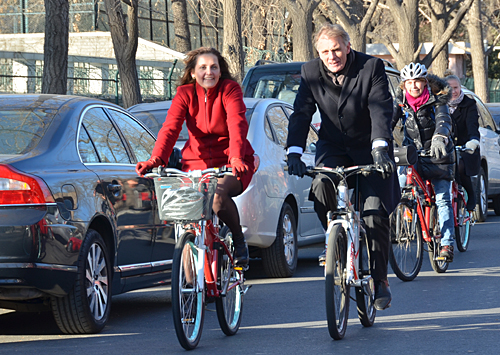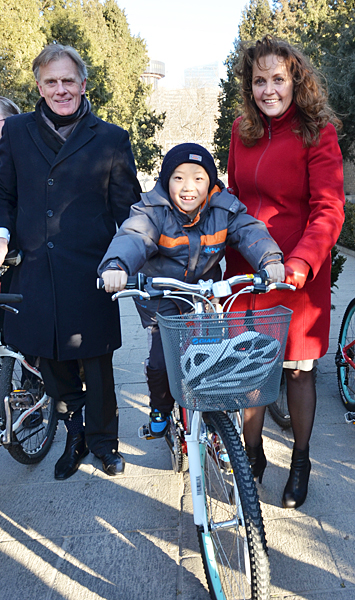|
 |
|
Pia Olsen Dyhr (left), visiting Danish Minister for Transport, rides a bike with Friis Arne Petersen, Danish Ambassador to China and Mongolia, to the Danish Embassy in Beijing on January 20 (CHEN RAN) |
"Denmark is going to make Copenhagen carbon neutral by 2025. What else will you do to make it a reality besides promoting cycling?"
That was the question 9-year-old Ge Tianyu posed to Pia Olsen Dyhr, visiting Danish Minister for Transport, at the Danish Embassy in Beijing on January 20.
A week before Dyhr's arrival, the embassy launched an online competition through its verified social media accounts, inviting followers to upload and share their stories and pictures relating to bicycles. In return, those lucky 10 followers could bring a friend to the embassy and talk about transportation with the minister in person. Ge's mother, Lin Mei, was one of the 10.
 |
|
Nine-year-old Ge Tianyu poses with Pia Olsen Dyhr (right), visiting the Danish Minister for Transport, and Friis Arne Petersen, Danish Ambassador to China and Mongolia, at the Danish Embassy in Beijing on January 20 (CHEN RAN) |
"Welcome to China!" Ge greeted Dyhr in English as soon as she was in sight of the embassy, riding a bike alongside Friis Arne Petersen, Danish Ambassador to China and Mongolia.
"Denmark plans to be totally fossil-free in all sectors by 2050. In 2020, we will reduce CO2 emissions by 40 percent. We are quite ambitious and the transportation sector will also contribute," Dyhr said.
"One part was redeploying bikes. We have invested heavily, 2 billion in Danish krone in the past four years, and we will continue doing that. We are investing 28.5 billion Danish kroner in high-speed rails for the next 10 years. Besides that, there is no taxation on electrical vehicles. We also have EU regulations, where we have tried to limit the level of emissions that each vehicle can emit. The levels are decreasing all the time," Dyhr said. "Thank you for your very intellectual question."
Temperatures of minus 3 degrees Celsius and strong winds in the Chinese capital did not deter Dyhr from getting on the bike. "I was a bit worried as it was smoggy yesterday when I arrived. But today's sunshine is nice for cycling," Dyhr told Beijing Review.
Denmark is known for its bicycle-friendly nature, which according to Dyhr, has gone through many different phases. Having a car used to be a symbol of status, but nowadays this status is reserved for bike-riders, because cycling is healthier, better for the environment and also saves time.
"As a minister I drive a car and also work in the car. But sometimes I ride a bike because it is faster. From my house to the ministry, it is about 8 km. If I ride a bike, it takes 20 to 25 minutes. If I drive a car, it takes at least half an hour," Dyhr noted. "I think the same will happen here. You will see the transition."
In big cities like Beijing and Shanghai, China's transportation sector is under a huge amount of pressure as more and more people flood in. No one solution could address this problem, according to Dyhr.
"Beijing is bigger than Copenhagen, but we face the same challenge. That is why we have to expand and heavily invest in the public transportation network. We have to ensure that public transportation is faster. One can see the benefits of using it compared to using a private car," the minister noted.
"I think we should find the best way of combining all forms of transportation," she added. | 